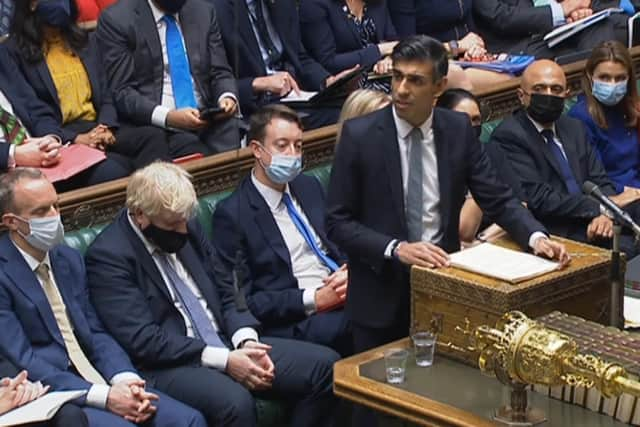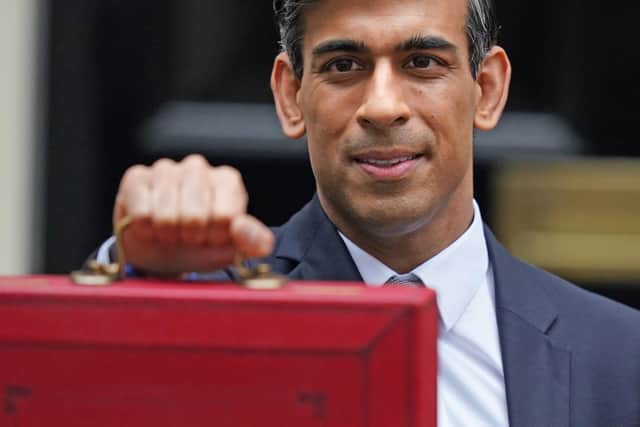Air passenger duty reforms and higher block grant to Northern Ireland announced in Chancellor Rishi Sunak’s budget


Meanwhile, the Chancellor has also announced that devolved administrations will be given the “largest block grants” since 1998, with an increase to Scottish Government funding in each year by an average of £4.6 billion, £2.5 billion for the Welsh Government, and £1.6 billion for the Northern Ireland Executive.
On the air passenger duty changes, he said: “Right now, people pay more for return flights within and between the four nations of the United Kingdom than they do when flying home from abroad.
Advertisement
Hide AdAdvertisement
Hide Ad“We used to have a return-leg exemption for domestic flights but were required to remove it in 2001. But today I can announce that flights between airports in England, Scotland, Wales and Northern Ireland will from April 2023 be subject to a new lower rate of Air Passenger Duty.”


Mr Sunak added: “We’re also making changes to reduce carbon emissions from aviation. Most emissions come from international rather than domestic aviation.
“So I’m introducing, from April 2023, a new ultra long haul band in air passenger duty – covering flights of over 5,500 miles, with an economy rate of £91.
“Less than 5% of passengers will pay more, but those who fly furthest will pay the most.”
Advertisement
Hide AdAdvertisement
Hide AdHe promised to help families meet the rising cost of living as he painted a positive picture about the health of the economy as it recovers from the pandemic.
The Chancellor opened his Budget statement promising the “stronger economy of the future”.
He said the Office for Budget Responsibility had forecast a faster bounce back, with growth expected to be 6.5% this year rather than the 4% previously expected.
But he acknowledged rising inflation, blaming it on the global reopening of economies following the pandemic, and promised further action to address strained supply chains.
Advertisement
Hide AdAdvertisement
Hide AdThe Chancellor said: “Employment is up. Investment is growing. Public services are improving. The public finances are stabilising. And wages are rising.
“Today’s Budget delivers a stronger economy for the British people: stronger growth, with the UK recovering faster than our major competitors.
“Stronger public finances, with our debt under control. Stronger employment, with fewer people out of work and more people in work. Growth up, jobs up, and debt down: Let there be no doubt – our plan is working.”
But he said inflation in September was 3.1% “and is likely to rise further” – the OBR expects CPI to average 4% over the next year.
Advertisement
Hide AdAdvertisement
Hide AdMr Sunak promised “help for working families with the cost of living”.
The budget watchdog said the economy was expected to return to its pre-Covid level at the turn of the year and scaled down its assumption of the long-term scarring effect of Covid-19 on the economy from 3% to 2%.
The OBR forecasts lower growth in 2022 than previously expected – down from 7.3% to 6% – partly because of the stronger performance in 2021, while in 2023 it is expected to be 2.1%, in 2024 1.3% and 1.6% in 2025.
Borrowing will also be lower than previously forecast, falling from 7.9% of gross domestic product (GDP) – a measure of the size of the economy – to 3.3% next year, then 2.4%, 1.7%, 1.7% and 1.5% in the following years.
Advertisement
Hide AdAdvertisement
Hide AdThe better-than-expected public finances allowed Mr Sunak to make a series of major promises on public spending.
“Today’s Budget increases total departmental spending over this Parliament by £150 billion,” he said.
“That’s the largest increase this century, with spending growing by 3.8% a year in real terms.”
It would mean a real-terms rise in spending in every single government department, he told MPs.
Advertisement
Hide AdAdvertisement
Hide AdMr Sunak also committed to reverse the controversial cut in the aid budget, which was return to its legally-mandated target of 0.7% of national income in 2024/25.
Local government will get £4.8 billion in grant funding over three years, the largest increase for more than a decade, Mr Sunak said.
The Chancellor announced £7 billion in business rate cuts, with the cancellation of next year’s planned increases and a 50% discount on business rates for a year for a series of retail and hospitality venues.
A wider reform of business rates will make the system “fairer and timelier” with revaluations carried out more frequently, every three years.
Advertisement
Hide AdAdvertisement
Hide AdOther reforms to corporate taxes included slashing the levy on bank profits and extending a corporation tax break on investment.
The Chancellor also announced a series of reforms to alcohol taxes from February 2023 – including a 5% cut in duty on draught products to help support pubs.
“That’s the biggest cut to cider duty since 1923. The biggest cut to fruit ciders in a generation. The biggest cut to beer duty for 50 years,” he said.
“It’s a long-term investment in British pubs of £100m a year. And a permanent cut in the cost of a pint by 3p.”
Advertisement
Hide AdAdvertisement
Hide AdBut in a boost to the hospitality industry now, Mr Sunak announced a planned increase in duties would be cancelled – a tax cut worth £3 billion.
He also confirmed a widely-expected freeze in fuel duty.